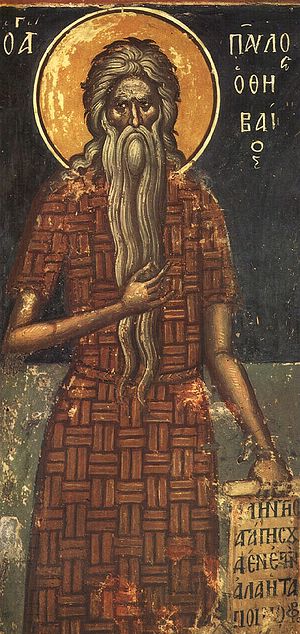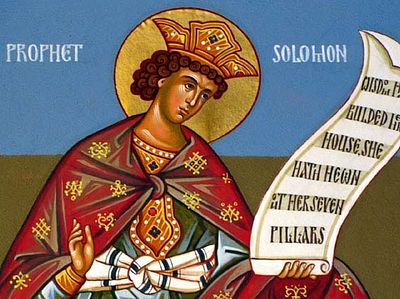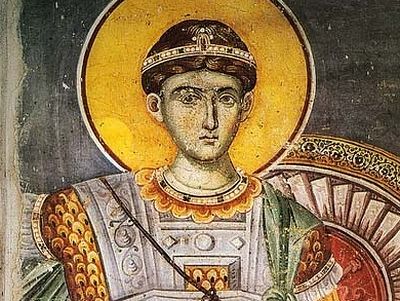Saint Paul of Thebes was born in Egypt around 227 in the Thebaid of Egypt. Left orphaned, he suffered many things from a greedy relative over his inheritance. During the persecution against Christians under the emperor Decius (249-251), Saint Paul learned of his brother-in-law’s insidious plan to deliver him into the hands of the persecutors, and so he fled the city and fled into the wilderness.
Settling into a mountain cave, Saint Paul dwelt there for ninety-one years, praying incessantly to God both day and night. He sustained himself on dates and bread, which a raven brought him, and he clothed himself with palm leaves.
Saint Anthony the Great (January 17), who also lived as an ascetic in the Thebaid desert, had a revelation from God concerning Saint Paul. Saint Anthony thought that there was no other desert dweller such as he. Then God said to him, “Anthony, there is a servant of God more excellent than you, and you should go and see him.”
Saint Anthony went into the desert and came to Saint Paul’s cave. Falling to the ground before the entrance to the cave, he asked to be admitted. The Elders introduced themselves, and then embraced one another. They conversed through the night, and Saint Anthony revealed how he had been led there by God. Saint Paul disclosed to Saint Anthony that for sixty years a bird had brought him half a loaf of bread each day. Now the Lord had sent a double portion in honor of Saint Anthony’s visit. The next morning, Saint Paul spoke to Anthony of his approaching death, and instructed him to bury him. He also asked Saint Anthony to return to his monastery and bring back the cloak he had received from Saint Athanasius. He did not really need a garment, but wished to depart from his body while Saint Anthony was absent.
As he was returning with the cloak, Saint Anthony beheld the soul of Saint Paul surrounded by angels, prophets, and apostles, shining like the sun and ascending to God. He entered the cave and found Abba Paul on his knees with his arms outstretched. Saint Anthony mourned for him, and wrapped him in the cloak. He wondered how he would bury the body, for he had not remembered to bring a shovel. Two lions came running from the wilderness and dug a grave with their claws.
Saint Anthony buried the holy Elder, and took his garment of palm leaves, then he returned to his own monastery. Saint Anthony kept this garb as a precious inheritance, and wore it only twice a year, on Pascha and Pentecost.
Saint Paul of Thebes died in the year 341, when he was 113 years old. He did not establish a single monastery, but soon after his end there were many imitators of his life, and they filled the desert with monasteries. Saint Paul is honored as the first desert-dweller and hermit.
In the twelfth century Saint Paul’s relics were transferred to Constantinople and placed in the Peribleptos monastery of the Mother of God, on orders of the emperor Manuel (1143-1180). Later, they were taken to Venice, and finally to Hungary, at Ofa. Part of his head is in Rome.
Saint Paul of Thebes, whose Life was written by Saint Jerome, is not to be confused with Saint Paul the Simple (October 4).
Troparion — Tone 3
Inspired by the Spirit, / you were the first to dwell in the desert in emulation of Elijah the zealot; / as one who imitated the angels, you were made known to the world by Saint Anthony the Great. / Righteous Paul, entreat Christ God to grant us His great mercy.
Kontakion — Tone 3
Today we gather and praise you with hymns as an unwaning ray of the spiritual Sun; / for you shine on those in the darkness of ignorance, / leading all mankind to the heights, venerable Paul, / adornment of Thebes and firm foundation of the fathers and ascetics.




![The Life and Passion of the Holy Great-martyr Eustathius [Eustace] Placidas, and of His Wife and Children](http://pravoslavie.ru/sas/image/101876/187657.x.jpg)